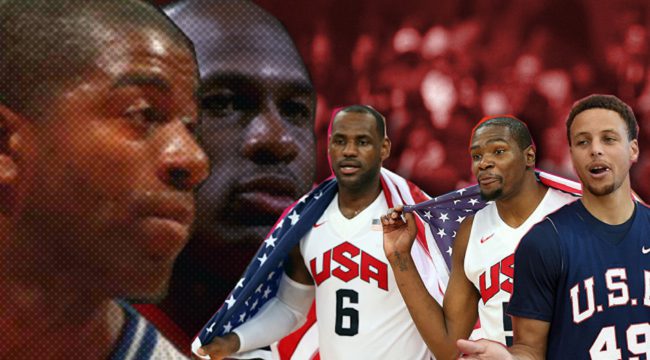
This exercise includes foreign-born players. Well, not really. But before finalizing this roster of 12 Americans, we were asked to construct the best possible Olympic team using the entire pool of NBA players – which includes guys from the United States, Canada, Serbia, France, Australia, and tens of other countries.
Guys like Marc Gasol, Rudy Gobert, and Serge Ibaka were legitimately considered. In the interest of fairness, Andrew Wiggins, Giannis Antetokounmpo, and even Kristaps Porzingis received a passing glance before being rightfully shunned in favor of superior players.
Bottom line: A perfect Olympic team featuring NBA players is one that essentially serves as a modern day Dream Team. Big surprise, right?
With that in mind, it’s important to note that this team was built with USA Basketball’s two-way playing ethos in mind. It runs like the wind, pressures the hell out of the ball, launches from deep with abandon, and uses athleticism and versatility to fully exploit the advantages Team USA has enjoyed over other countries for decades. Mike Krzyzewski roams the sidelines, and the governing rules of FIBA were taken into account.
It bears mentioning, too, that this is in no way a simple selection of the 12 best players in the world. The 2010-11 Miami and 2012-13 Los Angeles Lakers struggles for a reason. Basketball is a team game; it’s not played on paper. These guys were selected specifically because they fit not only the schematic profile this theoretical squad employs, but because they fit one another and are comfortable playing within the team concept, too.
Without further ado, this is the perfect Olympic basketball team.
Absolute Locks
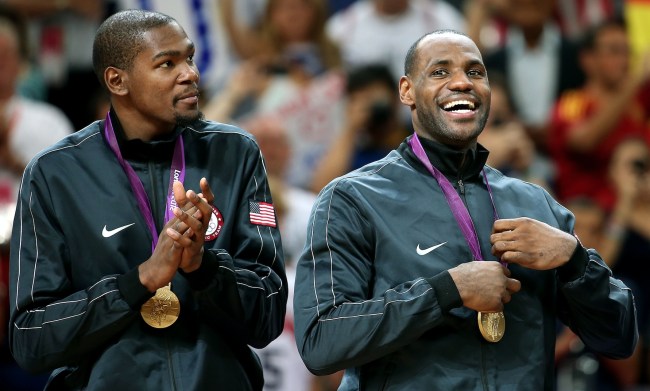
LeBron James
The order in which these 12 players are listed is no accident. There was a long stretch during the 2015-16 season when it appeared that James had been passed in the sport’s individual hierarchy, but then June came around, and the Cleveland Cavaliers’ icon reestablished himself as basketball’s most influential player with a crowning NBA Finals performance that’s somehow still underrated despite the plaudits he’s received in the interim.
LeBron, unbelievably, is even better on the international stage than he is domestically, where his physical advantages are merely unmatched as opposed to completely unfair. The three-time champion’s pass-first instincts and positional versatility can be leveraged even further when he’s playing with all-world teammates and against substandard competition, too.
It’s almost disrespectful to name one guy captain of a team stacked with so many proven leaders. If anyone here warrants that honor, though, it’s certainly James, who’s not only the best player in the NBA, but perhaps the best international performer in history of this game.
Kevin Durant
The Golden State Warriors’ newest star led the undermanned Americans to gold at the 2010 World Championships and was arguably their first or second most valuable player in London four years later. Durant isn’t as well-rounded as James, obviously, but that also doesn’t really matter come Olympic competition. He’s a terror in transition as a creator or finisher, runs ball screens like a point guard, and rains jumpers or draws defenders while spotting up on the weak side from the shorter FIBA three-point line.
Durant doesn’t have any weaknesses offensively during international play, of course, but it’s his work on the other end that sets him apart from a similarly gifted forward like Carmelo Anthony. Remember his sublime defensive effort during the Oklahoma City Thunder’s tooth-and-nail Western Conference Finals loss to the Warriors? Durant can wreak similar all-court havoc while playing for his country, which serves as a helpful reminder of just how much his game has grown since Turkey at the turn of the decade.
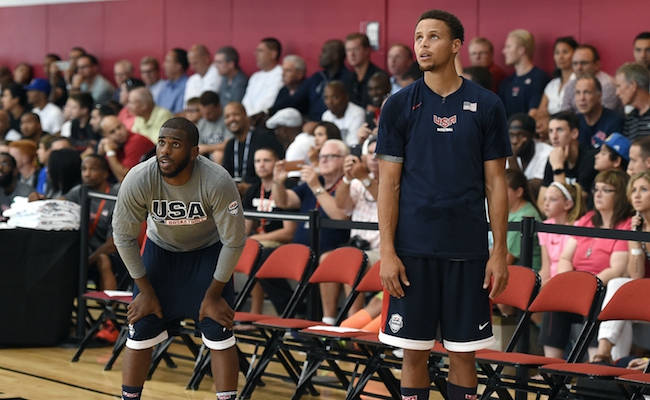
Stephen Curry
Curry’s foolproof candidacy for this theoretical squad basically boils down to this: There’s an argument to be made that you’d rather have the ball in his hands than anyone else’s, and he definitely poses the biggest threat as an off-ball shooter, screener, and cutter. The international three-point arc might as well be a mid-range jumper for the world’s preeminent marksman.
The defensive deficiencies, while real, are still somewhat overblown. Curry has quick, strong hands and is instinctual in passing lanes. His surprising effectiveness checking bigger players is key considering Krzyzewski’s switch-heavy defensive ethos, too.
Remember, Curry won’t be tasked with guarding Kyrie Irving or another elite playmaker while playing for this team. He’s more than good enough on that side of the ball to make his inclusion here obvious, and even if he wasn’t, it still wouldn’t matter – that’s how dominant Curry is offensively.
Chris Paul
Poor CP3. Another banner year by the Los Angeles Clippers’ floor general was mostly wasted by Blake Griffin’s absence during the regular season and a spate of injuries in the first round of the playoffs when it finally appeared his team was nearing full capacity.
Regardless, Paul’s innate sense of pace, remarkable playmaking genius, and pair of Olympic gold medals make him an easy selection for this 12-man squad. The 31 year old’s hyper-competitiveness and pervading air of calm would come in handy during unavoidable times of on-court strife, and like every player in this category, he can make an immense impact at both ends of the floor while playing on or off the ball.
Anthony Davis
His relatively underwhelming 2015-16 season with the New Orleans Pelicans’ has no bearing on Davis’ case here. Well, except for where he places on this list. The 23-year-old was poised to top it after a third professional campaign that ranked among the most efficient in league history.
But it’s not like falling behind three MVPs and arguably the greatest 6-footer ever in the pecking order is a major failing. Davis remains the best young player in basketball, and his lob-catching, shot-swatting, point-producing exploits would loom even larger when surrounded by a competent or even healthy supporting cast, let alone one like this. He still has room to improve as both a pick-and-roll and individual post defender, but those weaknesses – to the minimal extent they qualify as such – are mitigated against opponents wearing their country’s colors.
Based on last season alone, Davis was still the only big man who warranted “lock” status for this dream Olympic team. Just imagine, then, once he proves 2015-16 a blip and continues his quest to emerge as the best player in the world.
Controversial No-Brainers
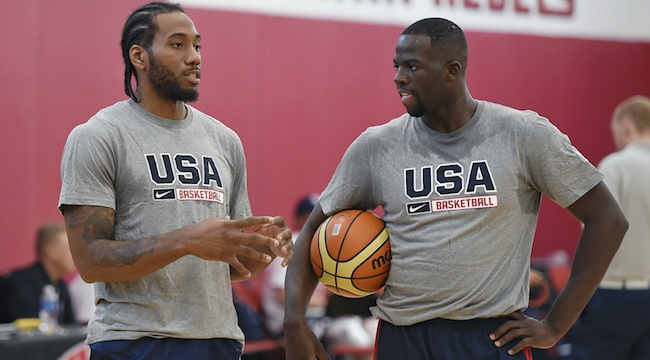
Draymond Green
The Warriors’ do-everything forward would have been an obvious pick for this team before helping the Warriors to 73 wins, finishing runner-up for Defensive Player of the Year a second consecutive season, and registering 13 triple-doubles. Now? The only reason Green isn’t in the category above is because so many league followers still deem him a product of Golden State’s system rather than one of the two players that drives it.
Even if that wildly outdated notion was accurate, the 26-year-old loudmouth would be a no-brainer choice. USA Basketball’s longstanding systematic principles under Krzyzewski and the limits of international competition in general mean Green is an even better fit for this squad than he is for the Warriors. Its best five-man lineup might even include him at center in a like-sized unit that could switch with impunity and push the pace to unfathomable speeds.
It will be a treat to watch Green play for Team USA in Rio, but getting the chance to see him running with LeBron and company would be something else entirely.
Kawhi Leonard
Call him this team’s first specialist if you like, but that does the San Antonio Spurs’ franchise player a disservice. Leonard developed into one of the most efficient scorers in basketball last season, making hay as a spot-up ace, post-up bully, transition terror, and pick-and-roll playmaker. His incredible improvement would have been a startling development all by itself, but was especially notable considering he led the Spurs to a historically dominant defense en route to winning a second consecutive Defensive Player of the Year award.
Leonard, at 24, is on his way to becoming the best perimeter defender ever, and has the resumé to already be in the discussion. That reality alone would make him a shoo-in here, but he also boasts the team-first mentality and positional versatility that are the real hallmarks of this squad. The scariest part? Leonard is still multiple seasons away from his prime.
Thinking about how he might fare in Olympic play is a fun exercise by itself. Here’s hoping we get to see him in action come 2020 when Gregg Popovich takes the coaching reins from Krzyzewski.
Klay Thompson
A guy who has a case as the best shooter on earth and doubles as an All-NBA caliber defender should be an easy selection for any international team. The rough edges of Thompson’s game – finding teammates off the bounce and an overall lack of verve when forced to put the ball on the floor – aren’t nearly as ragged as they were two years ago, and are further smoothed by the additional talent surrounding him.
Whether he ultimately “sacrifices” touches or offensive freedom with the new-look Warriors remains to be seen. What’s obvious in this speculative world, though, is that Thompson would inevitably do so when running the floor with James, Durant, Curry, and the rest – allowing him to focus solely on the strengths that make him such a valuable player in the first place.
The Best Remaining Roster Fits
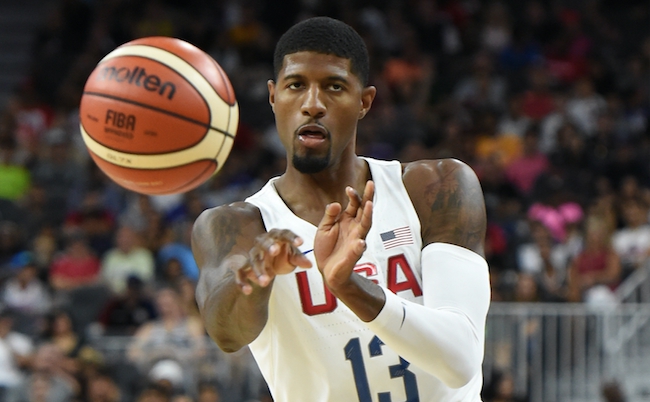
Paul George
The Indiana Pacers superstar wasn’t as simple a choice as the eight players listed above him. He’s not as good as James, not as dynamic as Durant, not as versatile Green, and not as dominant as Leonard. That’s not a slight, of course; those guys are the four best forwards in the league.
George is just behind them, though, featuring a package of physical gifts and still-burgeoning skills that makes him a perfect fit for this roster. He’s its second-best primary defender behind Leonard, and can make plays for himself and his teammates with the ball or feast on a diet of catch-and-shoot jumpers when the defense’s attention is elsewhere.
The 26-year-old wasn’t quite a lock or a no-brainer. Players with a similar international profile like Jimmy Butler and Anthony prevented George from being named in those categories. But once it came time to play, it’s safe to say you probably wouldn’t know it.
DeAndre Jordan
Two true big men doesn’t seem like enough on a 12-man roster, but Krzyzewski only took a pair of them – not counting a teenage Davis – to London in 2012, and this team is stacked with chameleons who play bigger than their size suggests. Choosing to carry two centers wasn’t hard; deciding who the second one would be was much easier than anticipated, too.
Jordan has clear flaws and hasn’t played international basketball since 2007, making him one of just three players here who haven’t appeared for their country’s senior national team. But the Los Angeles Clippers star’s otherworldly athleticism and much-improved defensive awareness make him a pretty straightforward choice regardless.
He’s arguably the best rim runner, roller, and rebounder in the NBA. Just think what Jordan would do, then, playing with not just Paul, but also passers like James, Curry, Green, and the next two players on this list while ravaging overwhelmed, undersized opponents. Scary. That his crazy-quick leaping ability allows him to take advantage of FIBA goaltending rules is just icing on the cake.
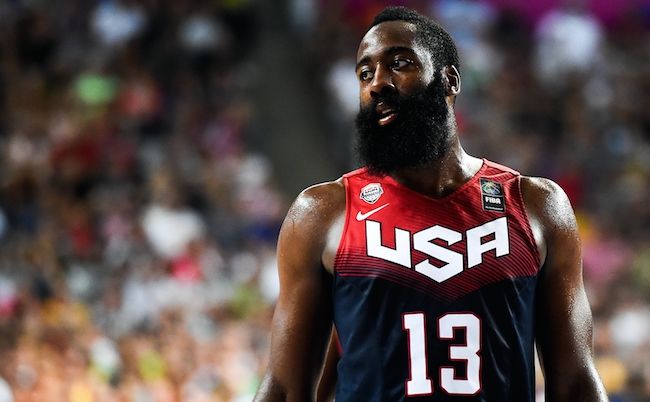
James Harden
Harden’s place near the bottom of this list probably isn’t indicative of how much playing time he’d receive compared to his teammates. The 2015 MVP runner-up is arguably the most effective ball handler in the NBA, and his passing ability somehow remains wildly underrated. There’s no use explaining his shot-making prowess or propensity for drawing fouls at length, either.
On a team featuring James, Durant, Curry, and Paul, though, there’s only so much ball to go around, and Harden is obviously best utilized when he’s the one handling it. He’s not the two-way force the vast majority of other selections are, too. But all that’s still beside the point, as Harden is one of the several most dynamic offensive players in basketball and would be able to exert more energy defensively with this team given his relative lack of court time.
John Wall
The Washington Wizards point guard is probably the most controversial choice on this squad. Wall dominates the ball and is a middling shooter at best. His top skill, playmaking, is duplicated or even bettered by guys like James, Curry, and Paul.
But every team needs a designated perimeter stopper – Leonard, Green, George, and even Thompson can be bothered by über-quick point guards – and there might not be a guard in the world who’s more disruptive defensively than Wall. At a sturdy 6-foot-4 with long arms, quick feet, and strong hands, he’s an absolutely monster defender – when dialed in, at least. The problem is that last season the 25-year-old was less engaged on that end of the floor than at any other time in his career.
That wouldn’t be a problem with this group, however. The presence of so many geniuses ensures Wall wouldn’t be forced to conserve his energy to keep the offense afloat, while recognizing his role as defensive ace would surely prove a motivating factor on that side of the floor. And when Wall does get the ball in his hands, watch out – he creates more scoring opportunities for himself and his teammates with hyperdrive fast breaks than any player alive.
Superstar Snubs And Others Considered
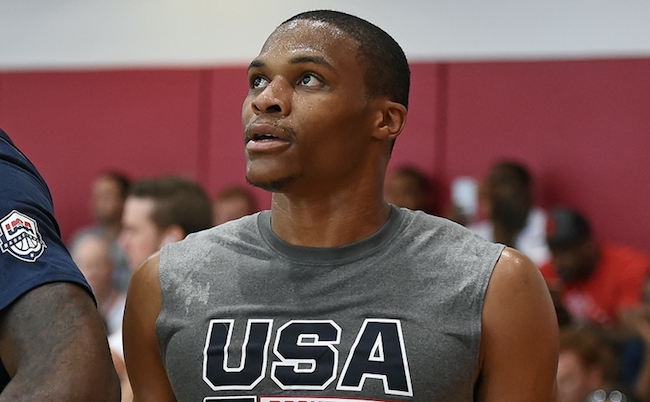
The biggest name who didn’t make the cut is probably Russell Westbrook. His absence comes back to two factors that help ensure this team would do much more than roll the ball out and play a more competitive style of All-Star Game: roster fit and occupying a role. Would you rather have the ball in Westbrook’s hands or that of James, Curry, Paul, or Durant? That’s an easy decision for the unbiased observer considering the Thunder superstar’s penchant for over-dribbling and a consistently streaky long-range jumper. More damning for his case is that Westbrook, despite the tools to be an absolute monster defensively, too often gambles for unlikely steals, gets stuck on screens, and generally doesn’t adhere to team-wide concepts. Ideally, the 26-year-old would have Wall’s spot as this dream team’s lightning-bug bench defender, but he can’t be trusted to thrive with that job description. Shame. A player of Westbrook’s caliber should be here.
DeMarcus Cousins was a tough omission. He was downright dominant for Team USA at the 2014 Worlds, and is poised to emerge as the Rio Olympics’ best big man after tossing hapless opponents aside like rag dolls during the Americans’ exhibition slate. His perpetually overlooked improvement as a defender would make him a worthy selection, too. But Jordan is close to as effective on the glass as his Sacramento Kings counterpart, could keep up with this group of thoroughbreds in transition, and erases mistakes on the perimeter at the rim as well as anyone in the league – a key given this team’s relentless defensive pressure on the perimeter. Is Cousins a better player than Jordan? Probably, but that’s not what this exercise is about.
Leaving Anthony off the team was much easier than it should have been considering his sterling resumé. He’s setting a record in Rio by appearing in his fourth Olympics for USA Basketball, and deserves applause for more than a decade of commitment to the national program. He’s also just a damn good international player. But Green and George simply bring more to the table across the floor at this point than Anthony does, and Harden is a more worthy primary ball handler and a more willing passer. Carmelo will probably light up the scoreboard for the Americans over the next two weeks. On a team this loaded, though, his less dimensional game just doesn’t stack up to those of his would-be teammates.
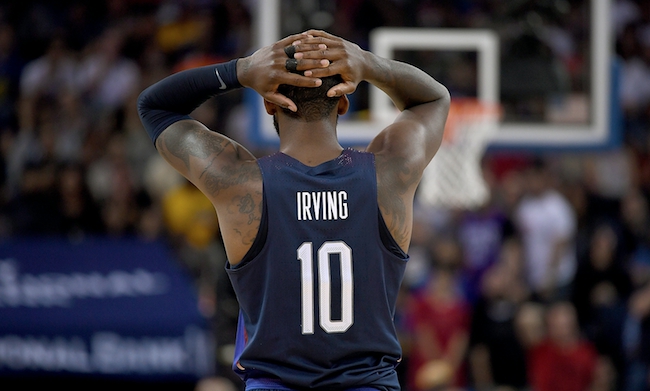
Kyrie Irving has been anointed Team USA’s point guard of the present and future, and rightfully so. He was MVP of the World Cup two years ago, and coming off a Finals performance that validated the hoopla surrounding his flashy game, could very well emerge as the red, white, and blue’s best player in Rio. But Curry and Paul certainly weren’t going to be left off this theoretical team; that possibility was never even broached. And after choosing Wall, a true point guard, as this group’s lockdown defender, its final roster spot went to Harden. In a vacuum, it could just as easily have gone to Irving, a player cut from a very similar cloth as the Rockets’ lefty. Why Harden? Just because he’s longer and bulkier than Irving, allowing him to more capably defend a bigger wing when asked.
A healthy Blake Griffin still has a claim as basketball’s best power forward. If he’d stayed on the floor for the majority of 2015-16 and played the way he did in the season’s first two months, there’s a very good chance he’d have made this team. But that didn’t happen, and the merits of James, Durant, George, and even Leonard as international 4s mean that Griffin would have been somewhat redundant anyway. He’s a better rebounder than those guys and a bit more stout as a post defender, and would even provide an additional dose of passing genius that Leonard, George, and perhaps Durant can’t quite match. On the other hand, the six-year veteran still hasn’t expanded his range to the NBA arc. That gaping hole combined with so much recent time spent on the sidelines made Griffin’s absence easier to swallow than it would be under normal circumstances.
The surest indication that this is a team more than anything else: Guys like Khris Middleton, J.J. Redick, and Avery Bradley were briefly considered. Are they anywhere near the top-12 players in the NBA? No way. But each would help fill a gap even a squad like this possesses. In the end, it seemed this dream team would get enough shooting and defense from its obvious picks to avoid going the surprising route of selecting a star role player.






